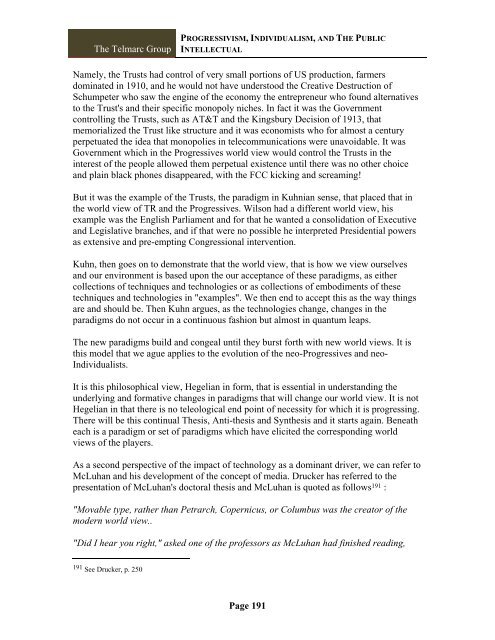progressivism, individualism, and the public ... - Telmarc Group
progressivism, individualism, and the public ... - Telmarc Group
progressivism, individualism, and the public ... - Telmarc Group
You also want an ePaper? Increase the reach of your titles
YUMPU automatically turns print PDFs into web optimized ePapers that Google loves.
The <strong>Telmarc</strong> <strong>Group</strong><br />
PROGRESSIVISM, INDIVIDUALISM, AND THE PUBLIC<br />
INTELLECTUAL<br />
Namely, <strong>the</strong> Trusts had control of very small portions of US production, farmers<br />
dominated in 1910, <strong>and</strong> he would not have understood <strong>the</strong> Creative Destruction of<br />
Schumpeter who saw <strong>the</strong> engine of <strong>the</strong> economy <strong>the</strong> entrepreneur who found alternatives<br />
to <strong>the</strong> Trust's <strong>and</strong> <strong>the</strong>ir specific monopoly niches. In fact it was <strong>the</strong> Government<br />
controlling <strong>the</strong> Trusts, such as AT&T <strong>and</strong> <strong>the</strong> Kingsbury Decision of 1913, that<br />
memorialized <strong>the</strong> Trust like structure <strong>and</strong> it was economists who for almost a century<br />
perpetuated <strong>the</strong> idea that monopolies in telecommunications were unavoidable. It was<br />
Government which in <strong>the</strong> Progressives world view would control <strong>the</strong> Trusts in <strong>the</strong><br />
interest of <strong>the</strong> people allowed <strong>the</strong>m perpetual existence until <strong>the</strong>re was no o<strong>the</strong>r choice<br />
<strong>and</strong> plain black phones disappeared, with <strong>the</strong> FCC kicking <strong>and</strong> screaming!<br />
But it was <strong>the</strong> example of <strong>the</strong> Trusts, <strong>the</strong> paradigm in Kuhnian sense, that placed that in<br />
<strong>the</strong> world view of TR <strong>and</strong> <strong>the</strong> Progressives. Wilson had a different world view, his<br />
example was <strong>the</strong> English Parliament <strong>and</strong> for that he wanted a consolidation of Executive<br />
<strong>and</strong> Legislative branches, <strong>and</strong> if that were no possible he interpreted Presidential powers<br />
as extensive <strong>and</strong> pre-empting Congressional intervention.<br />
Kuhn, <strong>the</strong>n goes on to demonstrate that <strong>the</strong> world view, that is how we view ourselves<br />
<strong>and</strong> our environment is based upon <strong>the</strong> our acceptance of <strong>the</strong>se paradigms, as ei<strong>the</strong>r<br />
collections of techniques <strong>and</strong> technologies or as collections of embodiments of <strong>the</strong>se<br />
techniques <strong>and</strong> technologies in "examples". We <strong>the</strong>n end to accept this as <strong>the</strong> way things<br />
are <strong>and</strong> should be. Then Kuhn argues, as <strong>the</strong> technologies change, changes in <strong>the</strong><br />
paradigms do not occur in a continuous fashion but almost in quantum leaps.<br />
The new paradigms build <strong>and</strong> congeal until <strong>the</strong>y burst forth with new world views. It is<br />
this model that we ague applies to <strong>the</strong> evolution of <strong>the</strong> neo-Progressives <strong>and</strong> neo-<br />
Individualists.<br />
It is this philosophical view, Hegelian in form, that is essential in underst<strong>and</strong>ing <strong>the</strong><br />
underlying <strong>and</strong> formative changes in paradigms that will change our world view. It is not<br />
Hegelian in that <strong>the</strong>re is no teleological end point of necessity for which it is progressing.<br />
There will be this continual Thesis, Anti-<strong>the</strong>sis <strong>and</strong> Syn<strong>the</strong>sis <strong>and</strong> it starts again. Beneath<br />
each is a paradigm or set of paradigms which have elicited <strong>the</strong> corresponding world<br />
views of <strong>the</strong> players.<br />
As a second perspective of <strong>the</strong> impact of technology as a dominant driver, we can refer to<br />
McLuhan <strong>and</strong> his development of <strong>the</strong> concept of media. Drucker has referred to <strong>the</strong><br />
presentation of McLuhan's doctoral <strong>the</strong>sis <strong>and</strong> McLuhan is quoted as follows 191 :<br />
"Movable type, ra<strong>the</strong>r than Petrarch, Copernicus, or Columbus was <strong>the</strong> creator of <strong>the</strong><br />
modern world view..<br />
"Did I hear you right," asked one of <strong>the</strong> professors as McLuhan had finished reading,<br />
191 See Drucker, p. 250<br />
Page 191












